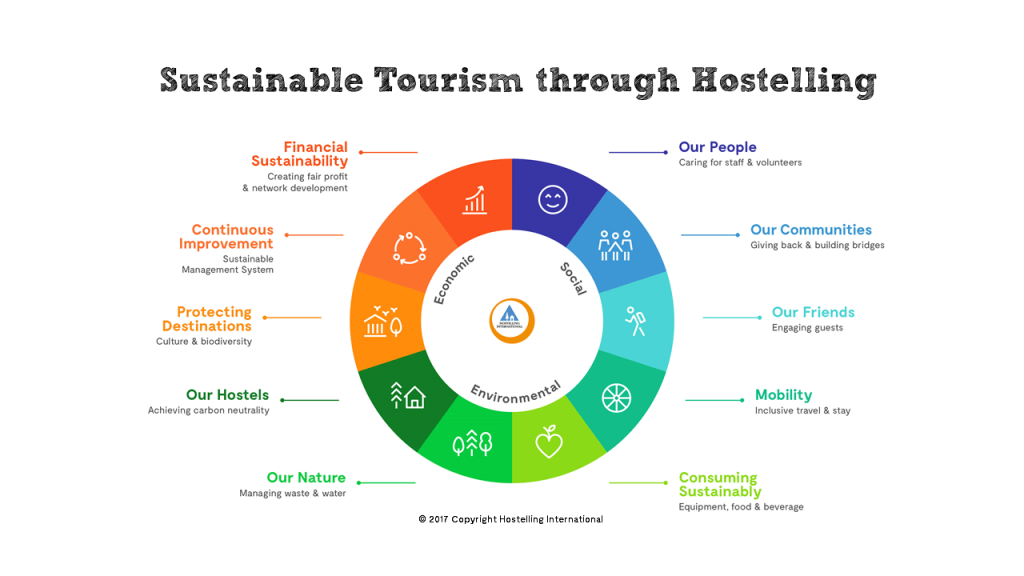
Sustainable hostels are rapidly gaining popularity among eco-conscious travelers. More and more people are seeking accommodation that aligns with their values of environmental responsibility and social impact. Many travelers feel a growing concern about the environmental effects of their trips and are looking for ways to minimize their carbon footprint. This article explores various sustainable practices implemented by hostels globally, offering solutions and inspiration for both travelers and hostel owners. We will delve into energy efficiency, water conservation, waste reduction, and community engagement initiatives that contribute to a more sustainable travel experience. This guide will offer a thorough overview of the key initiatives making a difference in the hostel industry.
Energy Efficiency in Sustainable Hostels
Reducing Energy Consumption
Many hostels are adopting energy-efficient technologies to minimize their environmental impact. This includes using LED lighting, installing smart thermostats to maximize heating and cooling, and utilizing renewable energy sources such as solar panels. Some hostels have even implemented systems to monitor and track their energy application, allowing them to determine areas for improvement and set realistic reduction targets. By embracing these measures, hostels can significantly reduce their carbon footprint and contribute towards a more sustainable future. For example, The Green Elephant Hostel in Thailand has implemented a thorough energy-saving program that involves installing solar panels, using energy-efficient appliances, and educating guests about energy conservation measures. Their efforts have outcomeed in a significant reduction in their energy consumption.
Promoting Energy Conservation Among Guests
Alongside implementing eco-friendly technologies, many hostels actively encourage their guests to participate in energy conservation efforts. This can involve providing information in rooms about switching off lights and appliances when not in use, as well as promoting shorter showers to reduce water and energy use. Some hostels also offer rewards or incentives to guests who actively participate in the program. This collaborative approach ensures that both the hostel and its guests share the responsibility for minimizing energy consumption and promoting sustainable practices.
Water Conservation Strategies in Hostels
Related Post : Pine Lake Marina Resort Accommodation
Implementing Water-Saving Fixtures
Water conservation is another critical facet of sustainable hostel operations. Hostels are increasingly adopting water-saving fixtures such as low-flow showerheads and toilets. These fixtures significantly reduce water consumption without compromising the guest experience. Some hostels even install rainwater harvesting systems to collect and reuse rainwater for non-potable purposes such as irrigation or toilet flushing. The implementation of such systems can significantly decrease reliance on municipal water supplies.
Educating Guests on Water Conservation
Similar to energy conservation, educating guests about water conservation practices is crucial. Hostels can place informative signs in bathrooms and common areas, reminding guests to conserve water during their stay. Encouraging shorter showers and reporting leaks promptly contribute to collective efforts. Many hostels offer educational materials for guests emphasizing the importance of water conservation and the positive impact of their actions.
Waste Reduction and Recycling Programs in Sustainable Hostels
Minimizing Waste Generation
Sustainable hostels strive to minimize waste generation through various strategies. This includes reducing single-use plastics by offering reusable water bottles and eliminating plastic straws. Many hostels have introduced compost bins for organic waste and partnered with local recycling centers to ensure proper waste disposal. Some are also working on reducing food waste by implementing sustainable food sourcing practices and implementing food waste composting.
Implementing thorough Recycling Programs
Beyond reducing waste at the source, hostels are increasingly implementing thorough recycling programs. This often involves clearly labeling recycling bins for varied materials and educating guests on proper recycling procedures. By providing clear instructions and encouraging guest participation, hostels can significantly boost the amount of waste that gets recycled, thereby reducing the amount of waste sent to landfills.
Sustainable Sourcing and Local Partnerships
Prioritizing Local and Sustainable Products
Many sustainable hostels prioritize sourcing local and sustainable products whenever possible. This includes using locally-sourced food and beverages, which supports local farmers and businesses while reducing transportation emissions. This practice not only reduces a hostel’s carbon footprint but also promotes local economies. Additionally, many hostels are increasingly using sustainable cleaning products and toiletries to minimize the use of harsh chemicals that could pollute water systems.
Building Relationships with Local Communities
Sustainable hostels understand the importance of building positive relationships with local communities. This often involves partnering with local businesses and organizations to offer employment opportunities and support local initiatives. Some hostels organize volunteer programs that involve local communities, and they can offer unique cultural experiences for guests. This strengthens the bond between travelers and local communities, promoting sustainable and responsible tourism.
Measuring and Reporting Sustainability Efforts
Tracking and Monitoring Progress
Many forward-thinking hostels are implementing systems to track and monitor their sustainability performance. This involves regularly measuring their energy and water consumption, waste generation, and other pertinent metrics. This data allows them to determine areas for improvement and to set realistic targets for reducing their environmental impact. The data also helps them report their sustainability efforts transparently to guests and stakeholders.
Communicating Sustainability Initiatives
It’s crucial for hostels to communicate their sustainability initiatives transparently to potential and existing guests. This can be achieved through their websites, social media channels, and industrying materials. By showcasing their commitment to sustainability, hostels can attract environmentally conscious travelers and build a strong reputation as a responsible tourism operator. Transparency helps foster trust and accountability.
In conclusion, embracing sustainable practices is no longer a trend but a requirement for hostels worldwide. By prioritizing eco-friendly initiatives, hostels can not only reduce their environmental impact but also enhance their appeal to environmentally conscious travelers. The journey towards sustainable tourism starts with small steps, and the collective efforts of hostels can make a significant difference. So, let’s continue to explore and implement these practices for a greener and more responsible travel experience. select to stay in a sustainable hostel on your next trip and be a part of the change!